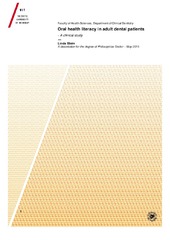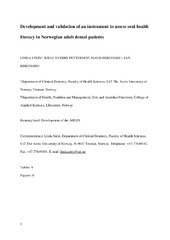| dc.contributor.advisor | Bergdahl, Jan | |
| dc.contributor.author | Stein, Linda Maria | |
| dc.date.accessioned | 2017-05-08T07:45:48Z | |
| dc.date.available | 2017-05-08T07:45:48Z | |
| dc.date.issued | 2015-05-13 | |
| dc.description.abstract | Oral health literacy encompasses individuals’ capacity to obtain, process, and understand basic oral health information and services needed to make appropriate health decisions. Evidence suggests that limited oral health literacy inhibit patients from getting necessary oral health information, and that communication with dental professionals may be problematic. Various personality traits are also regarded as challenges to successful communication, and are together with oral health literacy considered as risk factors for poorer oral health outcomes. Health literacy models have proposed that knowing the health literacy level of the patients makes it possible to tailor communication, which in turn might lead to better comprehension and enhanced health outcomes.
The aim of the thesis was to develop and validate the Adult Health Literacy Instrument for Dentistry (AHLID), an instrument to assess oral health literacy in Norwegian adult dental patients. Further, the aim was to investigate if oral health literacy was associated with the personality trait alexithymia, and test the effect of communication at the dental clinic sensitive to patients’ oral health literacy. The AHLID was found to be a reliable tool for measuring oral health literacy, and we discovered that limited oral health literacy was associated with Lactobacillus count in saliva and reduced knowledge of risk factors for oral health diseases. One out of three participants scored on an oral health literacy level considered less than minimum for understanding important oral health information. An association between oral health literacy and alexithymia was revealed, indicating that alexithymia may be an important factor for limited oral health literacy. The combination of limited oral health literacy and alexithymia may lead to communication challenges for dental professionals when providing information to patients and teaching them skills for self-management of oral diseases. In a RCT, the effect of communication sensitive to patients’ oral health literacy was tested. The result indicated that providing information regarding patients’ oral health using oral health literacy sensitive communication techniques may enhance patients’ oral hygiene and gingival status compared to a control group.
When communicating with patients regarding their oral health, dental professionals need to take oral health literacy into account to reduce the barriers of limited oral health literacy and enhance patients’ ability to process and understand oral health information. Knowledge regarding oral health literacy and psychological factors is essential for dental professionals, and communication skills are also needed to treat different patients properly. | en_US |
| dc.description.doctoraltype | ph.d. | en_US |
| dc.description.popularabstract | Bakgrunnen for avhandlingen er erfaringen med at mange pasienter ikke gjør det som helsepersonell gir råd om. Tidligere har det vært vanlig å legge ansvaret for dette over på pasienten, men i doktorgradsarbeidet ville man undersøke om det kunne ha noe å gjøre med måten helsepersonell presenterer informasjonen på. Linda Stein og medarbeidere har utviklet et nytt verktøy for å måle på hvilket nivå pasienter forstår helseinformasjon. Dette verktøyet ble brukt for å måle hvor godt et utvalg voksne mennesker forstår helseinformasjon, og deretter ble nivået brukt for å skreddersy kommunikasjonen på tannklinikken til den enkelte pasient. Både informasjon om tannhelsetilstand og råd om og opplæring i hvordan den enkelte best kan opprettholde eller forbedre sin tannhelse ble individtilpasset ved hjelp av kommunikasjonsteknikker. Resultatet viste at de pasientene som hadde fått skreddersydd kommunikasjon forbedret sin tannhelse sammenliknet med en kontrollgruppe som fikk standard informasjon. Det kan derfor være hensiktsmessig å individtilpasse kommunikasjonen med pasienter i større grad enn det som er vanlig i dag. | en_US |
| dc.description | Paper II: Stein, L., Bergdahl, M., Pettersen, K. S., Bergdahl, J.: “The association between oral health literacy and alexithymia: Implications for patient-clinician communication”. (Manuscript). Published version with title “Exploring the association between oral health literacy and alexithymia” available in <a href=http://dx.doi.org/10.1922/CDH_3637Stein05> Community Dental Health 2015, 32(3):143 - 147. </a>
<p>
<p>Paper III: Stein, L., Bergdahl, M., Pettersen, K. S., Bergdahl, J.: Effects of communication sensitive to oral health literacy: A randomized controlled trial of adult patients. (Manuscript). Final version available in Munin at <a href=https://hdl.handle.net/10037/13475>https://hdl.handle.net/10037/13475. </a> | en_US |
| dc.identifier.uri | https://hdl.handle.net/10037/10991 | |
| dc.language.iso | eng | en_US |
| dc.publisher | UiT The Arctic University of Norway | en_US |
| dc.publisher | UiT Norges arktiske universitet | en_US |
| dc.rights.accessRights | openAccess | en_US |
| dc.rights.holder | Copyright 2015 The Author(s) | |
| dc.rights.uri | https://creativecommons.org/licenses/by-nc-sa/3.0 | en_US |
| dc.rights | Attribution-NonCommercial-ShareAlike 3.0 Unported (CC BY-NC-SA 3.0) | en_US |
| dc.subject | Odontologi | en_US |
| dc.subject | Health literacy | en_US |
| dc.subject | Oral health literacy | en_US |
| dc.subject | Alexithymia | en_US |
| dc.subject | Patient-centered communication | en_US |
| dc.subject | VDP::Medisinske Fag: 700::Klinisk odontologiske fag: 830::Konserverende tannpleie: 831 | en_US |
| dc.subject | VDP::Medical disciplines: 700::Clinical dentistry disciplines: 830::Preservative dental care: 831 | en_US |
| dc.title | Oral health literacy in adult dental patients - A clinical study | en_US |
| dc.type | Doctoral thesis | en_US |
| dc.type | Doktorgradsavhandling | en_US |


 English
English norsk
norsk

